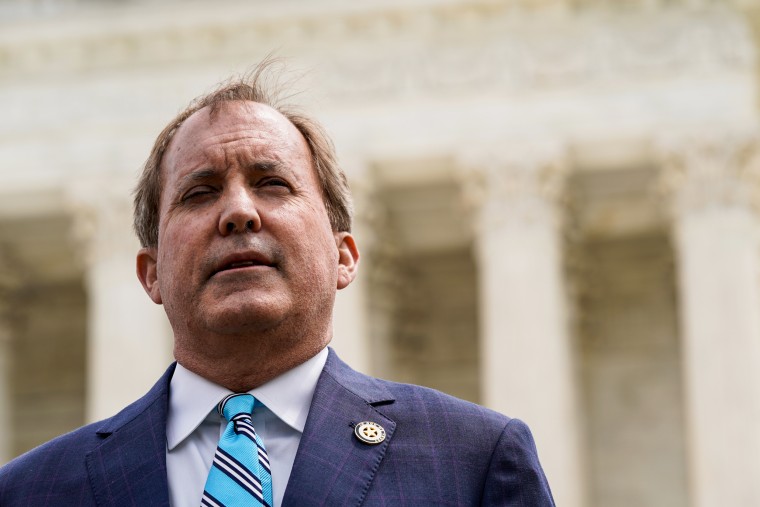Texas Attorney General Ken Paxton and Yelp are suing each other over language included on the pages of crisis pregnancy centers — which aim to dissuade people from having abortions — that accurately noted that they may not have licensed medical professionals on staff.
The subject of Paxton’s suit is a notice Yelp included on the reviews of some crisis pregnancy centers for six months, from August 2022 to February, which noted that such places “typically provide limited medical services and may not have licensed medical professionals onsite," court filings show.
Paxton’s suit, filed last week in Bastrop County District Court, alleges that Yelp’s language misled consumers about crisis pregnancy centers’ offerings and violated the Texas Deceptive Trade Practices Consumer Protection Act through the notice.
Yelp argues that the notice is protected free speech and that it was added after it learned some centers “were leading users seeking abortion care away from medical providers to anti-abortion counseling services.” It’s unclear exactly how many centers were affected; Yelp has said it recategorized nearly 470 business pages as pages for crisis pregnancy centers last year alone.
Crisis pregnancy centers do not perform abortions, and they are mostly affiliated with anti-abortion religious organizations, according to the Crisis Pregnancy Center Map, a database created by researchers at the University of Georgia. Many of the centers lure pregnant women with the free resources, including diapers, baby clothes and tests for sexually transmitted infections.
More than 2,500 crisis pregnancy centers operate in the U.S., nearly 200 of them in Texas, where abortion is banned with exceptions only for limited circumstances.
Paxton’s suit claims that at least one pregnancy resource center reached out to Yelp offering to provide copies of its employees’ medical licenses and a description of the medical services it offered and that Yelp took two months to edit the notice on that page.
But research cited in Paxton’s suit reveals that the majority of people who staff crisis pregnancy centers are not, in fact, licensed medical professionals: As of 2019, about 15% of crisis pregnancy centers’ combined staff and volunteer workers were licensed medical professionals, amounting to just over 10,200 of more than 68,800 workers, a report published by the Charlotte Lozier Institute, an arm of the anti-abortion group Susan B. Anthony Pro-Life America.
Yelp’s court filing, submitted in the Northern District of California, where its headquarters is based, calls the initial notice it used for crisis pregnancy centers “a truthful statement intended to enable Yelp users to make informed choices” and adds that the company never removed crisis pregnancy centers from its platform.
The company’s filing also cites a 2014 study that analyzed more than 250 crisis pregnancy center websites and found that 80% continued to provide at least one false or misleading piece of information, with many of the statements focusing on supposed risks of abortion.
In June 2022, two undercover NBC News producers visited state-funded crisis pregnancy centers in Texas and found that counselors falsely claimed abortions cause mental illness and could lead to cancer and infertility.
After Paxton and 23 other attorneys general complained in a letter to Yelp CEO Jeremy Stoppelman — who has publicly come out in support of abortion rights — about the notice in February, the company amended the notice to say crisis pregnancy centers “do not offer abortions or referrals to abortion providers.”
Paxton’s office then issued a notice saying the revised notice provides “an accurate description,” Yelp’s filing notes.
“The Attorney General has publicly conceded that this statement is ‘accurate,’ but still intends to punish Yelp using his authority to prosecute allegedly deceptive trade practices,” the company’s filing says.
According to Yelp, Paxton sent a letter Sept. 22 notifying it his intention to sue. Yelp filed its complaint Wednesday, a day before Paxton filed his suit, requesting an order that would declare his case unconstitutional, enjoin him from prosecuting Yelp and award the company attorneys’ fees.
A Yelp spokesperson said in a statement, in part: “The trust and safety of our users is a top priority for Yelp, which is why we take extensive measures to provide consumers with relevant and reliable information when they search for local businesses on our platform. This is especially critical when people are searching for healthcare services on Yelp, including reproductive care. While some people come to Yelp to find businesses that offer the pregnancy resources that crisis pregnancy centers provide, there are others who turn to Yelp to find reliable information about abortion providers.”
The spokesperson added that Yelp has employed moderators for years who manually evaluate the pages of businesses and recategorize them as crisis pregnancy centers when they do not provide abortion services or referrals to abortion providers.
Through the suit, Paxton is seeking an injunction to prevent Yelp from including the notices on the pages of crisis pregnancy center; civil penalties of up to $10,000 per violation, payable to the state of Texas; attorneys’ fees; court costs; and restitution for consumers.
“Yelp cannot mislead and deceive the public simply because the company disagrees with our state’s abortion laws,” Paxton said in a statement. “Major companies cannot abuse their platforms and influence to control consumers’ behavior, especially on sensitive health issues like pregnancy and abortion.”
Paxton’s attorneys did not immediately respond to requests for comment Monday.
A hearing is set for Jan. 4, according to the docket.
CORRECTION: (Oct. 3, 2003, 11:38 a.m. ET): A previous version of this story misstated the percentage of crisis pregnancy centers’ staff and volunteers who were licensed medical professionals in 2019. That figure is about 15%, not 40%.
